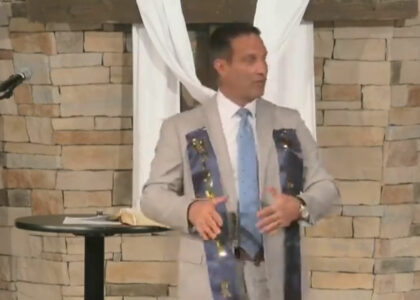Who Am I? Part 3
Text: Eph. 2:1-3; 4:17-19
Watch on YouTube HERE
Introduction
- The question of Identity drives many of our societal issues and challenges.
- Two weeks ago, we explored the more traditional strategy for knowing yourself that emphasizes the institutional role of family and the larger social community, as well as cosmic, supernatural forces that define who we are, the roles we play, and our value to others.
- A problematic strategy when made absolute & absorbs Christianity.
Looking Inward: Making Absolute the Intrapersonal Source of my Identity
- The Sovereign Self of Expressive Individualism (Bellah & Taylor)
- The contemporary strategy: You look within to discover the dreams and desires, the feelings & passions that constitute your true self & that you must authentically express as your life in the world.
- People today are taught: Be who you want to be and do what you want to do. Home, family, and religion can be rejected and ignored if they do not support the true you.
- Dale Kuehne observes, “If we don’t like or aren’t comfortable with who we are, we are encouraged to remake ourselves in whatever manner we are able, and science will allow.”
- Consider all the songs and movies you have heard that affirm this strategy and inspire us to aspire to fulfill our dreams.
- “Let it Go” one of the best-selling songs of all time is sung by Elsa, a character from the movie Frozen. It is something of an anthem for Generation Z, being viewed on YouTube over 1.5 billion times: As Tim Keller explains, the song’s sentiment.…we become ourselves only by asserting our individual desires against society, by expressing our feelings, and fulfilling our dreams regardless of what anyone says.
- The contemporary strategy: You look within to discover the dreams and desires, the feelings & passions that constitute your true self & that you must authentically express as your life in the world.
As Christians, We Can Acknowledge the Positive Contributions of this Strategy.
- As Christians, we acknowledge the importance of looking inward as a move to counter the rigidity of the traditional strategy made absolute.
- Christian thinkers have long realized the importance of inward thoughts, feelings, and passions.
- Christianity affirms the importance of the heart and its loves.
- God designed us with emotions, desires, passions, and dreams. See the Psalms and Paul’s writings.
- Beginning in the Hebrew Scriptures you see the importance of the individual, often in contrast to social expectations. God is at work and calls not only nations and tribes to serve him, but also individuals and their choices make a difference in the world.
- The Value of Thoughtful Self-Refection: In traditional societies, many felt forced to conform & had a sense of frustration, limitation, and anger.
- Many stories of immigration to America were driven by the rigid limitations of a social hierarchy.
- The prophets and Jesus: Open your eyes! Open your ears!
- A Greater Openness to Those Who are Harshly Excluded & Rejected Because They do not Fit Societal Norms:
- Greater sensitivity to the marginalized & dynamics of exclusion.
- The role this strategy played when combined with the Christian Rhetoric of MLK in the effort to promote racial justice & integration in a society that was resistant to social change.
- Note: Jesus was not an expressive individualist, but he was a strong critic of how religious institutions excluded & marginalized people. They were important in his ministry, he had compassion for them as he articulated his Father’s love for them.
- Authenticity: Authenticity as a moral ideal is important, especially if the alternative is blind conformity to external demands that lead to hypocrisy.
- The Flesh: Sin has damaged much inside of us so we must be honest in evaluating how that dynamic plays out in each of us.
As Christians, We must Recognize the Limits of this Strategy if it is Deified (made Absolute).
- Only looking inward to find yourself is a major contributor to identity confusion and instability, anxiety and depression.
- This approach to identity assumes that human nature is plastic, that identity is fluid, and that values are personal; therefore, each person is free to construct a personalized sense of self and personal values.
- In the transgender movement, feelings are more important than chromosomes and biology. Technology tries to alter appearances.
- An identity based primarily on feelings is unstable and incoherent because it assumes an ordered inner world of emotions and desires that is coherent and harmonious.
- Look at the challenges involved in sorting through your conflicting feelings during a week. How do you choose which strong feelings are the real you? What about that recurring angry feeling, or greedy desire, or covetous longing for more? Are those your authentic you?
- An identity based on expressing ourselves—without considering others—is actually an illusion.
- Because of such conflicts, we need some grid of beliefs to help us filter our inner world.
- Early Saturday morning, Jackie cried out in terror. I ran upstairs, woke her from a nightmare, and assured her that she was safe, that I was near, and that I love her.
- Was her terror in that dream an indicator of the real Jackie?
- Should my words of assurance make any contribution to helping her sort out the variety of feelings that had rushed through her during a dream?
- You cannot validate yourself by yourself: we are wired for relationships!
- Searching social media, the web, and other places for others to affirm our sense of self.
- Many therapists & educators see their role as allowing a safe space for discovering, exploring, & affirming strong feelings of identity: but what value framework is guiding their work?
- A Fragile Self: Our Rapidly Changing Culture and Shifting Identity Markers Creates Anxiety for Many.
- You must perform well and succeed daily, or you are in trouble!
- It is very difficult keeping up with the rate of change.
- This approach to identity leads to greater fragmentation in our society.
- In its attempt to counter an oppressive majority, it too often leads to angry tribal factions competing for recognition and power status.
- Consider the role of strong emotions of five police officers being expressed in the tragic beating of Tyre Nichols. This is a complicated case study of strong feelings being our guide to action.
- What happens when all moral standards are relativized and now themselves based on feelings??
- Is there a transcendent moral standard that guides what we are to do with our strong feelings?
- Who will be our wise guide through all of this?
- Because of such conflicts, we need some grid of beliefs to help us filter our inner world.
Conclusion:
- At its best, Christianity sees the limits of each strategy and recognizes the problems that arise if either strategy is made absolute.
- In Lk. 14: 25ff, Jesus looks at the great crowd following him & violates their expectations about how to build a great movement.
- Christianity that is absorbed by either/or both strategies is a problem.
- It is perilous to ignore who Jesus is and what he did and taught!
- Our desire to be accepted by and accommodated to our culture.
- Reading Bonhoeffer’s book, The Cost of Discipleship, as a teenager and wondering why what he wrote was new to someone raised in a successful American church.
- Bonhoeffer was willing to follow his own advice in his book. He took a stand against German culture and died as a martyr rather than compromise the teaching of Jesus.
- The institutional-emotional rise of Nationalism in Germany under Hitler.
- The use of flags, mass gatherings, and propaganda in every form of available media. Most churches accommodated to what was happening.
- Bonhoeffer and the failed plot to assassinate Hitler.
- A Christian witness of light in the darkness of prison and in facing the death penalty.
Notes
Expressive Individualism: The major tenets of expressive individualism can be summarized in seven points. The seven points form a coherent worldview, tell a compelling story, and… set out a strategy for forming personal identity.
- The best way to find yourself is to look inward.
- The highest goal in life is happiness.
- All moral judgements are merely expressions of feeling or personal preference.
- Forms of external authority are to be rejected.
- The world will improve dramatically as the scope of individual freedom grows.
- Everyone’s quest for self-expression should be celebrated.
- Certain aspects of a person’s identity—such as their gender, ethnicity, or sexuality—are of paramount importance.[6]
[1] Rosner, B. (2022). How to Find Yourself: Why Looking Inward Is Not the Answer (p. 25). Crossway.
[2] Rosner, B. (2022). How to Find Yourself: Why Looking Inward Is Not the Answer (pp. 25–26). Crossway.
[3] Rosner, B. (2022). How to Find Yourself: Why Looking Inward Is Not the Answer (p. 28). Crossway.
[4] Keller, T. (2015). Preaching: Communicating Faith in an Age of Skepticism (pp. 134–135). Viking.
[5] Keller, T. (2015). Preaching: Communicating Faith in an Age of Skepticism (p. 135). Viking.
[6] Rosner, B. (2022). How to Find Yourself: Why Looking Inward Is Not the Answer (p. 24). Crossway.





